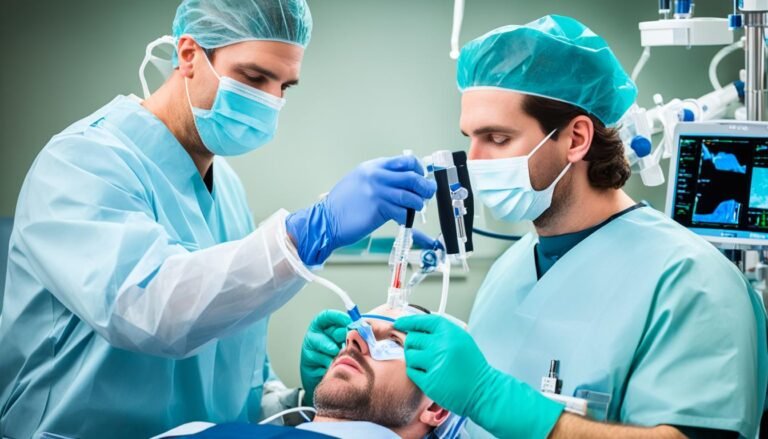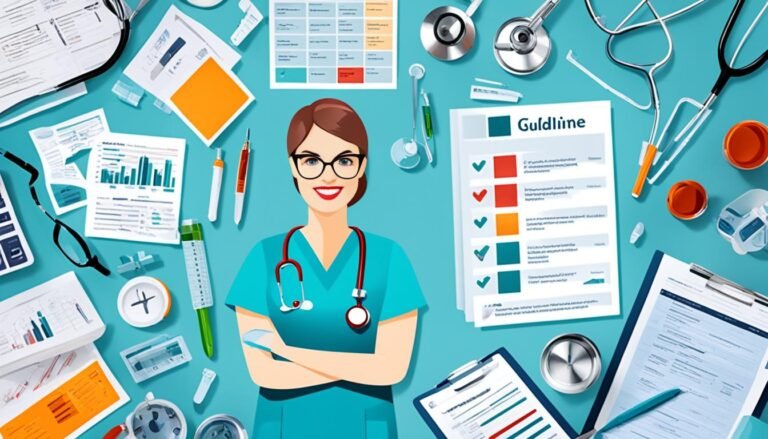What is Involved in a Master’s in Medical Statistics?
Medical statistics are key in healthcare to track down what causes diseases. It also helps to make treatments better and set health policies. Getting a Master’s in Medical Statistics gives healthcare workers tools for making decisions based on facts. This often leads to better health results for patients.
The University of Oxford offers a special program for this: the MSc in Evidence-Based Health Care (Medical Statistics). It’s made for healthcare pros looking to boost their stats knowledge and skills. We’ll dive into what this master’s program covers, how to get in, how it’s taught, and what jobs it can lead to.
Entry Requirements and Application Process
Applying to the University of Oxford’s MSc in Evidence-Based Health Care is simple, but know this first. You must meet specific requirements before you apply.
The program is for healthcare professionals like doctors, nurses, and midwives. You need to know the basics of statistics and must love medical stats. Apart from the University’s general rules, knowing calculus, algebra, and other fields is essential for statistical knowledge.
To get in, fill out an application form and send your documents. These include your school records, a CV, and a statement about your interest in medical statistics and your career aims. Always check the app guidelines on the Oxford website to make sure your application is top-notch.
Getting into the MSc program is tough because it’s known worldwide. They look at your full package: your skills, experience, and what you can bring to medical statistics.
After applying, you should hear back in a few weeks. The lucky ones will get an email first. It will have details on how to lock in their spot in the program.
Starting your MSc journey at Oxford can lead to many healthcare, research, and academic paths. So, put your best foot forward in the application. Show your love for medical statistics.
Stay tuned for the next section, where we will explore the comprehensive curriculum and course structure of the MSc in Evidence-Based Health Care (Medical Statistics) program at the University of Oxford.
Curriculum and Course Structure
The MSc in Evidence-Based Health Care (Medical Statistics) at the University of Oxford is a program that helps healthcare workers learn medical statistics. Students can take this program part-time. This lets them juggle it with their work.
This program has two main modules and four you can choose from, plus a big final project. These first two modules, Essential Medical Statistics and Statistics for Clinical Trials, are the foundation. They teach important statistical techniques for medical statistics.
After these core modules, students can pick from a variety of topics. These include meta-analysis, big data epidemiology, and much more. This lets each student focus on what they’re interested in or what they want to do in their career.
This mix and match of modules means students can really customize their learning. They can specialize in the areas that matter most to them. This makes the learning experience deeper and more personal.
The course also includes a dissertation project. This is a big research project you do with a supervisor. For this, you’ll use what you’ve learned to analyze real healthcare data.
In the end, the program makes sure you really understand medical statistics. It sets you up to use this knowledge well in healthcare.
Key Features of the Curriculum:
- Two core modules providing a foundation in medical statistics
- Four optional modules covering specialized areas of medical statistics
- Opportunity to tailor studies to individual interests and career goals
- Completion of a research dissertation using statistical techniques
“The curriculum of the MSc in Evidence-Based Health Care (Medical Statistics) program offers a comprehensive and flexible approach to learning medical statistics.” – Dr. Sarah Thompson, Program Coordinator
Teaching and Learning Format
The MSc in Evidence-Based Health Care (Medical Statistics) program at the University of Oxford is perfect for those who work. It mixes online and blended learning. This lets professionals fit learning into their busy lives.
Blended modules have a week in Oxford for face-to-face teaching. This allows students to interact with teachers and peers. It leads to deep discussions and exploration of complex topics. Afterward, students continue learning online, guided by their tutors.
Those leaning towards fully online learning can take remote modules. This study-at-your-own-pace approach suits those with many commitments. It begins with self-study and progresses to online activities that put your knowledge to the test.
A virtual learning area is always available. Here, students can connect, discuss, and find study materials. Tutors are on hand to offer support and advice. This helps ensure everyone is equipped to excel in their studies.
The teaching approach for the MSc in Evidence-Based Health Care (Medical Statistics) is well-rounded. It helps students build their know-how in statistics for healthcare. Whether you like in-person classes or prefer online, the program is designed to meet your needs.
Assessment and Graduation Requirements
The MSc in Evidence-Based Health Care at Oxford uses exams to check students’ stats knowledge. These tests are written, like online papers, after each learning section. This way, students can show what they’ve learned and how good they are at it.
Students also finish a big dissertation. It’s like the final test of all their learning, done with a teacher’s help. This project lets them explore a topic, analyze health data, and add to what we know in medical stats.
For their dissertation work, students put into practice what they’ve studied. They use stats and think deeply to make new insights. This part shows they can research on their own, think sharply, and make solid points.
To get the program diploma, students have to pass all their classes and meet particular test rules. Their dissertation can’t be more than 15,000 words. It must also follow the program’s academic quality.
The testing in the Health Care (Medical Statistics) program makes sure students really understand stats. It also helps them get ready to join in medical research that’s based on clear facts.
Finishing all tests and the graduation rules is a big deal for students in Medical Statistics. It shows they really know their stats, can think hard about health data, and help grow medical research. Students can go on to find important jobs in medicine, science, and more.
| Assessment Components | Weightage |
|---|---|
| Module Assessments | 70% |
| Dissertation | 30% |
Above, you see how important each test part is for your total grade. Module exams make up 70% because they check how well you know and use stats in different situations. The dissertation is 30%, showing how much work and sharp thinking it needs to finish this final project well.
Career Opportunities for Medical Statistics Graduates
Graduates from the MSc in Evidence-Based Health Care (Medical Statistics) program find many job openings. They bring unique skills to healthcare and other fields. Their knowledge makes them valuable in various roles.
Here’s a look at the paths these graduates might take:
- Medical and Epidemiological Research: They could work in research, using statistics to better understand medical studies and diseases.
- Research Councils: These graduates might help evaluate research, making vital decisions based on data for councils.
- The Pharmaceutical Industry: Pharmaceutical and regulatory bodies need them to look at clinical data and study the safety and effectiveness of drugs.
- Non-Governmental Organizations (NGOs): NGOs hire them to handle health data, assess health programs, and push for better health policies.
- Governmental Institutions: At government health departments, they help shape health policies by analyzing healthcare data and program results.
- Academia: They can teach and do groundbreaking research in universities. This helps train future healthcare workers and improve healthcare.
- National Health Services: They play a key role in analyzing health data, checking the success of health programs, and suggesting ways to get better.
- Contract Research Organizations: These organizations help pharmaceuticals and others with clinical studies. Graduates might join them, overseeing trials and ensuring accuracy in results.
The need for skilled medical statisticians is great across these areas. Employers value the skills learned in the MSc program. Graduates can significantly influence healthcare and public health.
Opting for a career in medical statistics lets graduates change healthcare for the better. They help make crucial decisions based on solid facts. This way, they also push forward our medical understanding.
Importance of Medical Statistics Education
Medical statistics is key in healthcare. It uncovers disease causes, enhances treatments, and advises on health policies. A Master’s in Medical Statistics helps students analyze health data. They learn to choose the right research designs and use stats in clinical trials and public health.
This education teaches students to question and understand health research. They can then share their findings with medical experts and researchers. With good stats skills, they help make healthcare decisions based on facts.
“Medical statistics education empowers students to make sense of complex healthcare data, drawing meaningful conclusions and translating them into actionable insights. It equips them with the tools to assess the validity and reliability of research findings, evaluate treatment effectiveness, and contribute to evidence-based practice.”
Learning medical statistics gives students several important skills. They become good at analyzing data using special software. This means they can work with lots of information easily. They also learn different stats methods to solve medical research problems.
Moreover, this education sharpens students’ thinking and problem-solving skills. They can spot study biases and check the strength of their findings. By applying these skills, they can give trustworthy advice in healthcare.
Skills Learned in a Medical Statistics Master’s Program:
- Advanced statistical techniques for data analysis
- Study design and research methodology
- Data management and statistical programming
- Interpretation and communication of research findings
- Evaluation of treatment effectiveness and healthcare interventions
- Application of statistical software and tools
- Critical thinking and problem-solving in healthcare
With these skills, graduates from this program can make a big difference in health. They are ready to advance medical knowledge, better healthcare, and guide decision-making in healthcare and policy.
Best Universities for Medical Statistics Master’s Program
The University of Oxford offers an MSc in Evidence-Based Health Care (Medical Statistics) known worldwide. This program works closely with the Centre for Evidence-Based Medicine. The team includes famous experts, helping students learn from the best. Other top schools with great medical statistics programs are the London School of Hygiene and Tropical Medicine, Harvard University, Stanford University, and the University of Washington. They are well-known for their medical research and offer strong education and resources.
“The MSc in Evidence-Based Health Care (Medical Statistics) at the University of Oxford is considered one of the best programs in the field. Its partnership with the Centre for Evidence-Based Medicine ensures students get top-notch education from leaders. This program’s focus on evidence-based practice and its broad curriculum make it perfect for those into medical statistics.”
Here is an overview of the top universities for medical statistics master’s programs:
- University of Oxford: MSc in Evidence-Based Health Care (Medical Statistics)
- London School of Hygiene and Tropical Medicine: MSc in Medical Statistics
- Harvard University: Master’s in Biostatistics
- Stanford University: Master of Science in Biomedical Informatics
- University of Washington: Master of Science in Biostatistics
These top schools are key in medical research and in shaping skilled medical statistics professionals. Students at these universities get high-quality education, hands-on research chances, and a strong academic community.
Conclusion
The MSc in Evidence-Based Health Care (Medical Statistics) is a game-changer. It helps healthcare professionals enhance their skills in statistics. With its broad curriculum and various learning methods, students get ready for top careers in healthcare analysis.
Graduates become ready for many jobs in medical research, teaching, and healthcare. They know how to use stats to better patient care, create data-backed policies, and push medical boundaries forward.
This Master’s degree sets you on a path full of chances to innovate and change healthcare for the better. With their evidence-based skills, graduates can influence healthcare strategies. This can lead to healthier lives for people and communities around the world.
FAQ
Q: What is involved in a Master’s in Medical Statistics?
A: A Master’s in Medical Statistics teaches students the skills to work with health data. It includes selecting the right study designs. Then, it applies statistical methods to clinical research, epidemiology, and public health.
Q: What are the entry requirements for the Medical Statistics Master’s program?
A: Applicants need a basic understanding of statistics and must meet the University of Oxford’s entry requirements. They should be strong in calculus, algebra, and probabilities. Also, knowing matrix algebra is required.
Q: How do I apply for the Medical Statistics Master’s program?
A: Applying involves filling out an application form and providing documents. Visit the University of Oxford’s website for detailed information on what you need to apply.
Q: What is the curriculum and course structure of the Medical Statistics Master’s program?
A: This program starts with two core modules. Then, you choose four optional modules. Finally, you complete a dissertation. The core modules give you essential statistical skills. The optional ones let you focus on things like review analysis, meta-analysis, and statistical computing.
Q: What is the teaching and learning format of the Medical Statistics Master’s program?
A: Most of the program is online or in a blended format. This includes a week of classes in Oxford. After that, you continue learning at your own pace and with support. This way, working professionals can also join.
Q: How are assessments conducted in the Medical Statistics Master’s program?
A: At the end of each module, there are written exams or projects. These are usually submitted online. Your final project, a dissertation, is overseen by a supervisor.
Q: What are the job opportunities for Medical Statistics graduates?
A: With this degree, you can work in various fields. This includes medical and epidemiological research, the pharmaceutical industry, academia, and more. Employers are looking for graduates with expertise in medical statistics.
Q: Why is medical statistics education important?
A: Medical statistics is key in healthcare. It helps find the causes of diseases and improves treatments. A strong foundation in this field is crucial. It helps advance medical knowledge and has a real impact on patient care.
Q: Which universities offer the best Medical Statistics Master’s program?
A: The University of Oxford, London School of Hygiene and Tropical Medicine, and top US schools like Harvard and Stanford are known for their great medical statistics programs.
Q: What is the conclusion of the Medical Statistics Master’s program?
A: The MSc in Evidence-Based Health Care (Medical Statistics) program is a chance for healthcare professionals to dive deep into this field. Graduates find career paths in research, academia, and healthcare, making data-driven decisions.







